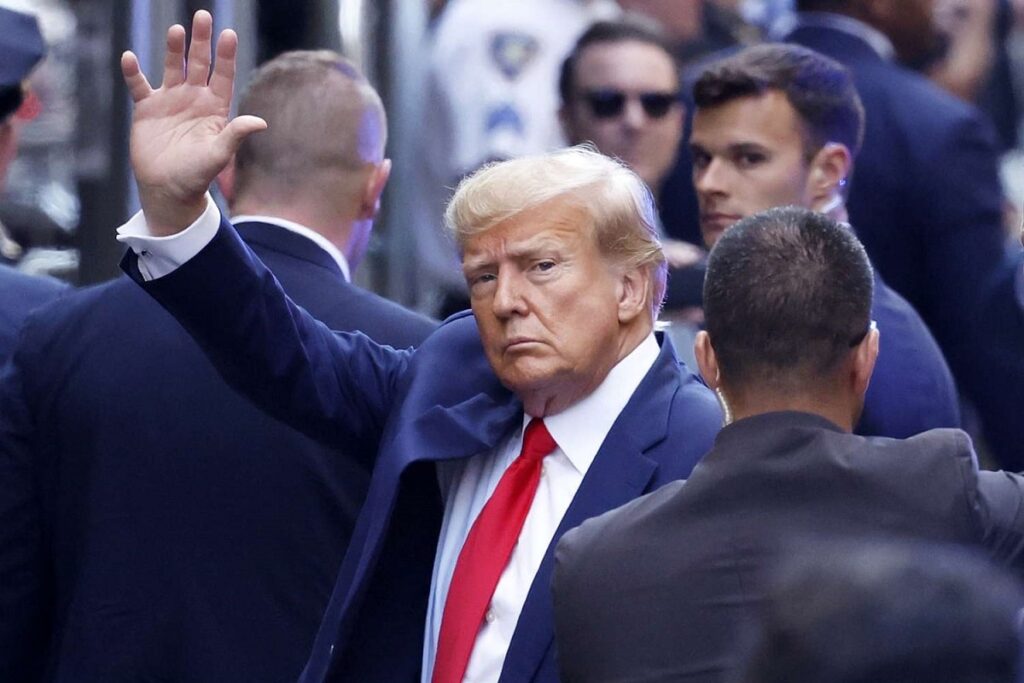There were “no surprises,” according to a number of legal experts familiar with the New York criminal justice system, in the accusations made against former president Donald Trump on Tuesday by the Manhattan district attorney. However, they point out that the broad scope of the alleged “catch-and-kill” scheme is noteworthy.
Trump entered a not guilty plea to 34 felony counts of falsifying company records connected to a hush money payment made in the final weeks of the 2016 presidential election when he appeared in a Manhattan courthouse on Tuesday.
According to the prosecution, Trump participated in a “scheme” to increase his chances of winning the 2016 election through a number of hush money payments made to support his campaign, and then “repeatedly and fraudulently manipulated New York business records” to hide this illegal activity.
Trump entered a not guilty plea to 34 felony counts of falsifying company records connected to a hush money payment made in the final weeks of the 2016 presidential election when he appeared in a Manhattan courthouse on Tuesday.
According to the prosecution, Trump participated in a “scheme” to increase his chances of winning the 2016 election through a number of hush money payments made to support his campaign, and then “repeatedly and fraudulently manipulated New York business records” to hide this illegal activity.
Prosecutors claimed that the “catch and kill” operations started in 2015 with an agreement with the CEO of National Enquirer publisher AMI to bury damaging information. They also claimed that payments were made to Stormy Daniels, Karen McDougal, and a former doorman at Trump Tower who claimed to have information about a false claim that Trump had an unmarried child.
Jerry Saland, a former assistant district attorney in the Manhattan DA’s office, told ABC News that “most people felt it was about Stormy Daniels.” Here, though, we find that it also involves McDougal and a doorman.
The alleged use of shell companies and talks between Trump and his former lawyer, Michael Cohen, according to Lance Fletcher, another former assistant district attorney at the Manhattan district attorney’s office, “appears to prove that Trump was aware that the payments were “improper.”
Yet, according to Fletcher, there are a number of challenges for prosecutors.
“Was Trump really trying to swindle people, or was he just following terrible legal advice? Was the money utilised to address a personal issue if it came from his own account?” Fletcher enquired.
A 16-page indictment, according to Fletcher, “discusses an intent to defraud and a purpose to conduct another felony, but does not identify what that other crime is.”
The purpose to defraud and the desire to commit another crime are what elevate this offence from a misdemeanour to a felony, extending the two-year statute of limitations to five years and increasing the possible jail term from one to four years, he said.
Prosecutors go into depth about Trump’s alleged use of hush money to sway the 2016 presidential race.
Scholl concurred that even while the following statement of facts extensively discusses how the alleged capture and kill strategy was utilised to influence the 2016 election, neither the indictment nor the particular election statutes that were broken are mentioned.
Scholl remarked that the statement of facts paper was peculiar and questioned why it was not included in the indictment as a conspiracy offence. However, Scholl said that only the charges listed in the indictment must be proven by the district attorney, not anything in the statement of facts.
When being questioned by reporters about other offences that Trump is accused of committing by fabricating business records, Manhattan District Attorney Alvin Bragg responded, “The law does not such demand,” when asked. Nonetheless, Bragg emphasised a number of laws he claimed could be relevant to the case, such as the New York state election law that makes it illegal to collude to support a candidature using illegal means;Federal election donation caps and rules that forbid making misleading representations, including statements that were intended to be made to tax officials.
Bachner stated that he anticipates Trump’s legal team will submit petitions to dismiss the indictment, making arguments such as statutes of limitations and the fact that the payments were made for private use and not with the intention of meddling in the election.
The timing of the payments, as well as the date of meetings related to the payments that are described in the prosecutors’ statement of facts, according to Bachner and other legal experts, however, appears to suggest that the objective was campaign-related and not for Trump’s personal interests.
For instance, prosecutors claimed in the statement of facts that after winning the election, Trump asked the publisher of the National Enquirer to a dinner at the White House to “thank him for his efforts during the campaign.”
Saurav Ghosh, a former enforcement attorney at the Federal Election Commission and current director of Federal Campaign Finance Reform at the watchdog group Campaign Legal Center, stated that “these illegal and undisclosed campaign expenditures undermined accountability and denied voters complete and accurate information about how Trump raised and spent money during the 2016 presidential election.”
“Although Trump has a right to due process of law just like any other criminal defendant, it is crucial that laws be upheld and that serious penalties are meted out when they are broken-regardless of the defendant’s identity, level of influence, or power, Gosh said.
